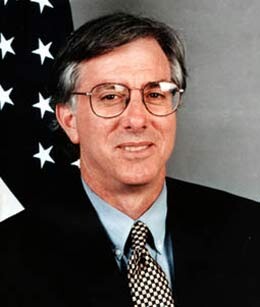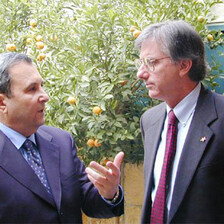The Electronic Intifada 10 November 2004

The cover of Swisher’s The Truth About Camp David. Click here to purchase the book on Amazon.com.
Electronic Intifada: In the interview, Ross claimed that Arafat’s greatest failure was “Camp David and afterwards”. Do you feel this statement accurately reflects the Palestinian leader’s role and legacy in the US-brokered Camp David talks with Israel?
Clayton E. Swisher: Unfortunately, Ambassador Ross continues to project a selective analysis of Camp David 2000 and what took place in its immediate aftermath. In The Truth About Camp David, one of the more astonishing revelations I collected was Ross’s own recounting of why he decided to deny Arafat’s formal request by letter for a follow-up summit on August 9, 2000, less than two weeks after the summit’s collapse. Ross’ verbatim quote is telling:
What were we supposed to do? Arafat, at Camp David, indicated no readiness to do anything. If we were to chase after him at that point then you would tell him that that kind of negotiating behavior was fine. You know what they were saying, right? Arafat goes back to a hero’s welcome for being defiant—the tradition of the Palestinian movement once again reinforced: “Don’t agree to anything; prove how you rejected everything!”And then right after that, what do you think he did? He came back and said, “OK.” He sent a letter to me saying, “Let’s hold another summit.” [Erupts in laughter.] Like, “Well fuck you!” [More laughter]. You know? We just shot our wad! You go out as a hero for being defiant—on what conceivable basis should we convene a summit without having some confidence that you’ll actually behave differently?” (Swisher, The Truth About Camp David, p. 362).

Dennis Ross
In my book, I publish Arafat’s full response to the parameters (See p. 399-401. Letter from Arafat to Clinton faxed December 28, 2000). I’ll let your readers decide whether that constituted a rejection or, more accurately as I believe, a leader showing serious interest while trying to fulfill his minimal responsibilities as a leader of the Palestinian people by seeking clarity on an offer made orally and without maps. Arafat or no Arafat—can one imagine any Palestinian leader agreeing to “finality of claims” without a written document, maps, and explicit definitions, i.e., what precise area constitutes the “Holy of Holies” on Jerusalem?
EI: Ross also stated that Arafat “had a chance to end the conflict and didn’t take it.” Was Camp David ever really this close to a reasonable settlement that the majority of Palestinians could have accepted?
CES: No. According to Ross’s deputy, Aaron Miller:
There was not a formalized, written proposal that covered the four core issues. There was no deal on the table. None of the issues were explained enough in detail to make an agreement, though the Israelis made an interesting argument on Jerusalem.
On the last point of Jerusalem, it is worth quoting the reaction of Gemal Helal, an influential State Department advisor who translated for President Clinton: “What the Palestinians were offered, no Arab leader could accept.”
I found it interesting that in several cases when I spoke to Israelis and Palestinians at Camp David 2000 that they are now in close agreement when it comes to criticizing the Clinton Administration for poor preparation, planning and management of the actual summit and how it contributed to the failure. Summit planning was the responsibility of the peace team Ross led.

Swisher’s security ID for the Camp David talks.
CES: That depends on what moment in time Ambassador Ross is referring. If he means “proposal” in the form of a “deal,” I refer you to my earlier answer. If he is referring to one of the many incomplete “proposals” that were bandied about in a disorganized, round-robin fashion, he is likely relying on his own memory, at times selective.
It is important here to note that at Camp David many of the oral proposals discussed and seemingly agreed to by both sides evaporated quickly, often with no written record. In my book, the reader will discover that of the 14 summit days, the process of reaching an agreement through “drafting attrition” (the process used by President Carter that is credited for helping Israelis and Egyptians succeed at the first Camp David), collapsed and was abandoned on the third summit night. This was mainly because the crisis created in the presentation of the draft, in which Ross, under intense pressure from Barak, made freelance edits to the draft just moments before Clinton’s formal presentation to Arafat. Those handwritten changes included alterations to the American ideas regarding the status of Jerusalem. For Palestinians, those controversial changes affirmed that the US was working in undue collusion with Israel. Ultimately, for Israelis and Palestinians alike, the slap-dash alterations by Ross on the most contentious core issue were unacceptable. In the wake of both their protestations, the drafting process was killed and the summit began to resemble what one would find in a bazarre. [Copies of that actual draft with Ross’s handwritten changes are contained in The Truth About Camp David insert].
EI: Ross made reference to his 2004 book about Camp David, “The Missing Peace: The Inside Story of the Fight for Middle East Peace”, claiming that the book “spelled out exactly what we offered, it spelled out exactly what was available, and exactly what Arafat did.” Have you read Ross’ book and what are your reactions to it as a document of historical record?
CES: Ambassador Ross kindly shared with me his book while in draft. I carefully read it. I won’t go into a full review here. But I will say this: while there are many useful facts and details, there are also inaccuracies kindled by his personal disdain for Arafat, the late Syrian President Hafez al-Asad, and several of their negotiators.
That said, as I tell serious researchers and students of the conflict wherever I speak, they would be foolish not to read Ambassador Ross’s account—and President Clinton and Madeleine Albright’s for that matter. Any good investigator looks at all the evidence. It goes without saying that a good investigator and analyst would likewise weigh each account against the normal balance of interests, personal and political, while similarly weighing the dissenting accounts by others who were directly involved (and less outspoken). In my book, I have tried to give the full range of views that exist by the key players who were directly involved. It was indeed interesting for me to hear them recall events so radically different in some cases.
EI: CBC asked Ross if Arafat’s death and possible Palestinian elections on the horizon would change Sharon’s plans to pull out of Gaza. Ross claimed that Sharon’s pursuit of a unilateral “disengagement” from Gaza is “based upon there being no partners”, adding that “If it begins to turn out that there might be partners then… you [can] coordinate how you hand off, you actually work out the terms of a hand off in which basically Israel takes steps and Palestinians take steps and suddenly you’re back in a process where the two sides actually make commitments to each other and fulfil them. That could be transforming.” What is your reaction to this statement?

Clayton Swisher (Photo: Nigel Parry)
Should Abu Ammar pass away, I do think that those who accept the underlying assumption of “no partner for peace” will be challenged to either resume negotiation or adopt another mantra. I doubt there is brewing a more honest change to this slogan along the lines of “no partner willing to accept my terms for peace” (it is admittedly less catchy).
But seriously, in the event of Arafat’s death, it is reasonable to expect a period of organizational chaos and fragmentation of delicate power arrangements that will take some time to sort. In this period, however long it takes, one can imagine the “no partner for peace” slogan becoming “no credible, empowered, in-control partner for peace.” Much will depend on how efficiently the Palestinian leadership reacts. But it will also depend on how Israel, the occupying power, cooperates (or not) in allowing for Palestinian elections; completing a coordinated Gaza withdrawal (or not); and, most importantly—if there is anything my research has taught me—ending settlement expansion so as not to further embolden those rejectionist groups seeking to undermine a negotiated peace via a two-state solution.
One of the related dangers now lies in the expectation that a mystical leader will step up after Arafat and be more pliant with Israel on the final status issues (borders, security, refugees & Jerusalem), be a more relenting leader than Arafat on issues like settlements, and be the type of leader who will accept what Sharon likely envisions—a rump state. I’m afraid this mindset will lead to the types of disappointments our government experienced vis-a-vis Mr. Chalabi in Iraq!
It is worth keeping in mind that there is no Palestinian now or in the immediate future who will be able politically (or any other way, for that matter) to accept less than what many Israeli and Palestinian recognize is the likely final-status outcome along the lines of Geneva Accord and others. Though stranger things have happened, there is also little reason to hope the Israelis will be willing to reach that compromise given the current leadership on its side.
For Palestinians, it is also worth mentioning that there is no logical reason to not prepare for the Gaza Withdrawal, if it does indeed take place, and the inevitable resumption of final-status dialogue. On this last point, I will add that despite all my criticisms of the American and Israeli governments during the Camp David 2000 period, there is no question in my mind that the Palestinian are due their fair share in the failure, specifically as it relates to negotiating strategy, ineffective internal power relations courted by Arafat that made negotiating with them difficult and confusing, and most seminally, public relations. The Palestinians abysmal failure to clearly and quickly articulate to the world their positions following Camp David is one of the chief reasons why Ross and others who got the first word in continue to be believed!
EI: Clayton Swisher, thank you.
CES: Thank you.
Related Links
Clayton E. Swisher, a former Marine reservist and federal criminal investigator, was educated as the University of Pittsburgh, Georgetown University, and is currently studying Law & Economics part-time at George Mason University. Swisher works as an associate for a Middle East consulting firm in Washington, DC, where he resides. Swisher is the author of “The Truth about Camp David” (Nation Books, 2004).


